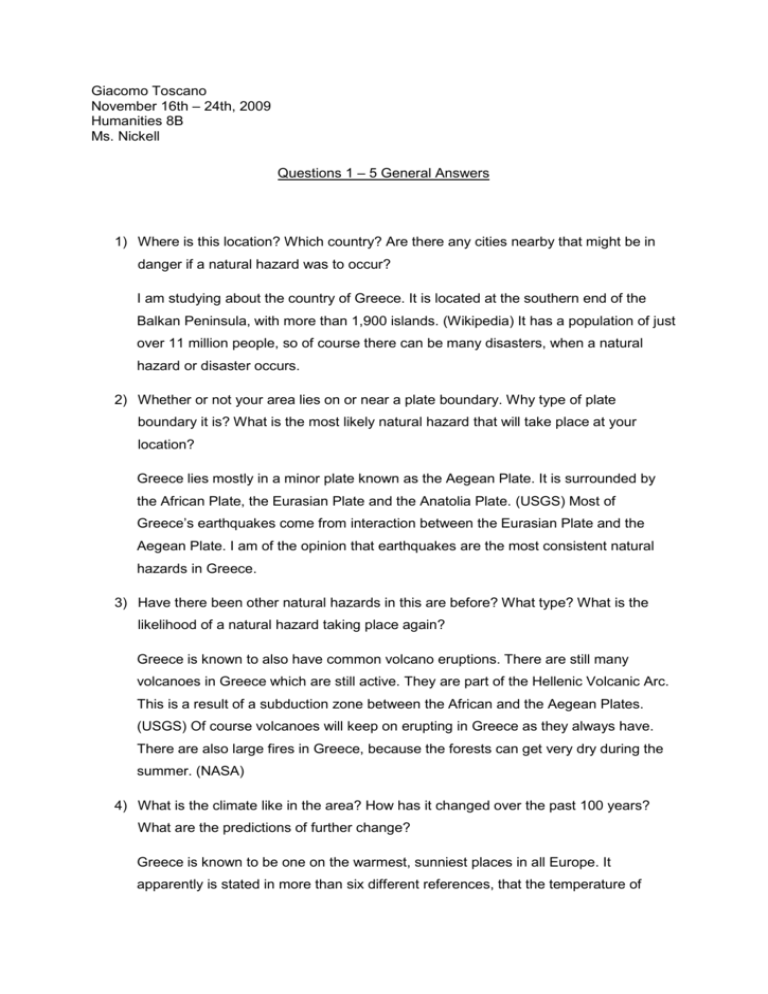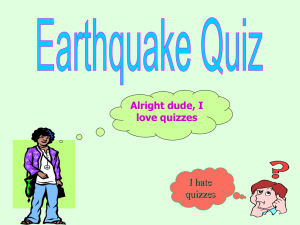Questions+1-5+on+Greece
advertisement

Giacomo Toscano November 16th – 24th, 2009 Humanities 8B Ms. Nickell Questions 1 – 5 General Answers 1) Where is this location? Which country? Are there any cities nearby that might be in danger if a natural hazard was to occur? I am studying about the country of Greece. It is located at the southern end of the Balkan Peninsula, with more than 1,900 islands. (Wikipedia) It has a population of just over 11 million people, so of course there can be many disasters, when a natural hazard or disaster occurs. 2) Whether or not your area lies on or near a plate boundary. Why type of plate boundary it is? What is the most likely natural hazard that will take place at your location? Greece lies mostly in a minor plate known as the Aegean Plate. It is surrounded by the African Plate, the Eurasian Plate and the Anatolia Plate. (USGS) Most of Greece’s earthquakes come from interaction between the Eurasian Plate and the Aegean Plate. I am of the opinion that earthquakes are the most consistent natural hazards in Greece. 3) Have there been other natural hazards in this are before? What type? What is the likelihood of a natural hazard taking place again? Greece is known to also have common volcano eruptions. There are still many volcanoes in Greece which are still active. They are part of the Hellenic Volcanic Arc. This is a result of a subduction zone between the African and the Aegean Plates. (USGS) Of course volcanoes will keep on erupting in Greece as they always have. There are also large fires in Greece, because the forests can get very dry during the summer. (NASA) 4) What is the climate like in the area? How has it changed over the past 100 years? What are the predictions of further change? Greece is known to be one on the warmest, sunniest places in all Europe. It apparently is stated in more than six different references, that the temperature of Greece has risen and that the country has become even warmer, and drier. (New York Times) 5) How developed is the civilization that exists in your location? What types of buildings? Ecosystems? Farms? Industries? Houses? One thing that caught my eye when I was looking at the fatalities caused by earthquakes in Greece was that there are practically none. (USGS) The most recent one in 2008, with a magnitude of 6.4, only had 2 fatalities. There were no fatalities in the 4 previous earthquakes, only to have 143 fatalities in a earthquake in 1999, which had a magnitude of only 6.0. (USGS) It is a law in Greece that all the houses must be built where the columns and beams carry the house and not the walls. These houses can resist up to an earthquake with a magnitude up to 8.0 on the Richter scale. (Xbuildings-x) Bibliography: NASA.com. 11 Sept. 2009. Web. 23 Nov. 2009. <http://earthobservatory.nasa.gov/NaturalHazards/view.php?id=39932>. USGS.com. United States Geological Survey, 21 Oct. 2009. Web. 23 Nov. 2009. <http://earthquake.usgs.gov/earthquakes/world/greece/tectonic_summary.php>. Wikipedia.org. Wikimedia, 25 Nov. 2009. Web. 27 Nov. 2009. <http://en.wikipedia.org/wiki/Greece>. X-buildings-x.com. 1 Dec. 2009. Web. 1 Dec. 2009. <http://x-buildings-x.com/viewtopic.php?t=19979115192234ZZJwOPf>.






